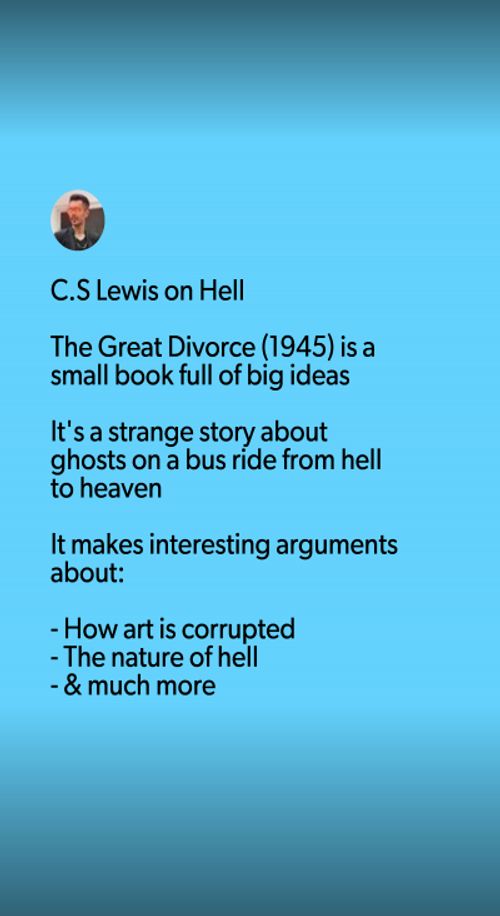A Twitter thread by Jash Dholani
Aug 01, 2022 · 3 mins read
0
Share

Part 1
C.S Lewis on Hell🧵
The Great Divorce (1945) is a small book full of big ideas
It's a strange story about ghosts on a bus ride from hell to heaven
It makes interesting arguments about:
- How art is corrupted
- The nature of hell
- & much more
9 insights from a classic👇🏻 https://t.co/Gu9ce7MgG6


Save
Share
1/ Marriage - or Divorce?
Blake wrote about the "Marriage of Heaven and Hell" - Lewis writes about their divorce
Lewis thinks the difference between heaven and hell can't be overcome through some "development, adjustment, or refinement"
Save
Share
2/ Lewis doesn't believe different moral choices are like "radii of a circle" where they all eventually meet in the center
Instead, each moral choice is a fork in the road
The final destination of two people making different choices actually grows further apart over time
Save
Share
3/ Describing hell = expanding hell
Lewis writes the "curious wish to describe Hell" is an attempt to expand hell
Relentless complaining, permanent dissatisfaction, a refusal to ever acknowledge truth or beauty -
- These are the acts of salesmen of hell
Save
Share
4/ Where do opinions come from?
Lewis asks if our opinions are "honestly come by"
More often than not, we absorb - and then project - beliefs only because they seem "modern and successful"
Save
Share
5/ How NOT to deal with the past
One of the ghosts in the novel is clinging onto her past
She says: "The past was all I had"
But to embalm and freeze the past for eternity - like an Egyptian mummy - is the "wrong way to deal with sorrow"
Save
Share
6/ The spirit of inquiry, corrupted
The spirit of inquiry is meant to lead to answers, not to an addiction to questions
A ghost compares questions to travelling:
"To travel hopefully is better than to arrive"
But, without a destination, "how could anyone travel hopefully?"
Save
Share
7/ The subversion of art
The origin of good art is simple: the artist catches "glimpses of Heaven" somewhere, and puts it down on paper or canvas
But when a love of the medium takes precedence over heavenly inspiration, the artist - and his art - is lost
Save
Share
8/ (Mis)using pity as a weapon
Pity's proper role is to be "a spur that drives joy to help misery"
But pity is often misused
Lewis writes: "Those who choose misery can hold joy up to ransom, by pity"
Pity can become the invisible string the miserable use to control the joyous
Save
Share
9/ To conclude: Lewis writes the difference between hell and heaven is one of kind and not of degrees. Hell is where the spirit of inquiry is corrupted into endless questioning, where art is without inspiration, and where pity is used as an excuse to spread misery.
Save
Share
0
0 saves0 comments
Like
Comments
Share